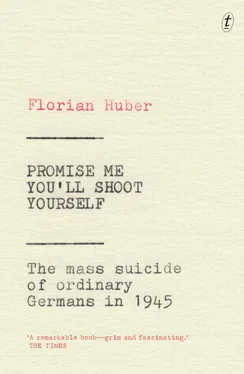Peering apprehensively onto the street, we saw Red Army soldiers engaged in a curious exercise. They were plunging long-handled brooms wrapped in rags into enormous pails and hastily daubing the walls of the houses. To our astonishment we saw a red sky over the market square. Fire!
Soon their house, too, was on fire. Soldiers armed with carbines looked on as Ursula and her mother carted blankets, clothes and food out of the house, through acrid, billowing smoke. In the yard, they loaded everything onto a wheelbarrow. They found a loose, shapeless tracksuit for Ursula, and a peaked cap, which she pulled down over her ears.
The blazing heat propelled them along. They ran through the Luise Gate into Turmstrasse and away, leaving behind them the fire, their house and their past life. They slid and stumbled over the cobbles, pushing their swaying wheelbarrow. Flames leapt out of the houses, licking at their skin and hair. The fire hadn’t yet got past the town wall and into the alleyways where the houses were smaller and built in brick. Ursula and her mother knocked at the door of their old washerwoman, who gave them the key to her summerhouse. There they hunkered down. Russian soldiers came by and rummaged through their suitcases. Ursula hid at the bottom of a mound of bedclothes.
‘Day and night we saw fire and thick clouds of smoke,’ she would remember in years to come. The fire raged for days. In the old town it claimed whole streets, including the main thoroughfares. In the smaller, connecting streets, most of the half-timbered houses with wooden roof trusses went up in flames. Further out of town, towards the station, the River Tollense and the town common, some buildings were hit by the fire while others escaped—but half if not three-quarters of the houses in Demmin were completely destroyed.
Most of those who had decided to stay in town and make it through the Russian invasion as best they could now had to flee the fire. There was no time to pack. People took refuge in the surrounding woods or escaped to the meadows by the rivers, to fields and pastures. Many sought shelter in nearby villages: Eugenieberg, Lindenfelde, Pensin. The more fortunate found a place to sleep in a barn or hayloft. Others spent the nights in the half-finished anti-tank ditches they had dug themselves only a few days before. Yet others slept by the canals, between bales of straw, or on the bare earth of the oilseed fields.
• • •
Those who fled the town saw a devastating sight when they turned to look back. Beneath a sky reddened by flames—and behind columns of smoke and dense grey-black mountains of clouds—the church tower of Demmin had vanished. The hundred-metre-high red-brick tower, with its windowed turrets and filigree spire—once a reassuring symbol of home for everyone who lived there and a prominent local landmark—had disappeared, shrouded in smoke. Marie Dabs, who had lived all her life within sight of the tower, wrote in her memoirs: ‘Our beautiful tall church tower—all our childhood, the first thing we saw when we returned home from a journey—was no longer to be seen.’ Although it was hidden, she still felt its power. But the comforting pull of home and familiarity had given way to the dark pull of impending disaster.
The first of May had started like any other bright spring day. But Karl Schlösser, who was at home with his family, saw nothing of the sun. Night had descended on them in broad daylight. Dense smoke billowed from the burning houses in Frauenstrasse, darkening the sky. Karl’s grandfather came down the stairs. ‘We must all get out of here,’ he said. The roof beams and rafters had caught fire. Together with their grandparents and great-grandparents, Karl and his younger brother fled the house with nothing but the clothes on their backs. Only his mother, Magdalena Schlösser, packed some provisions—and a handful of razor blades. The night the Soviet soldier had assaulted her, she had formed a resolve.
They set off at a run, past the red-brick school building that hadn’t yet caught fire, down the dirt path to Swan Pond, and along the bank between the willows. The streets were full of people fleeing the flames. They crossed the railway lines at the station and slipped through a small wooded thicket surrounding the Uhlan memorial. On the other side was the town boundary, and beyond that the open fields, where they stopped to rest amid the furrows and clumps of grass. For the moment they felt little more than relief at having made it out of town—away from the burning houses, the looting soldiers and the panic-stricken people, away from all the screaming and raging and groaning. All they could see when they looked back was a column of smoke rising above the fir trees.
Then Karl saw his mother standing before him. In her hand she held one of the razor blades she had packed before they took flight. ‘We’re going to heaven now, to join your father!’ Magdalena Schlösser was planning to kill them—Karl, his brother, their grandparents and great-grandparents—and then herself. There, in the middle of the field, she wanted to put an end to their nightmare. Karl’s grandfather shouted at her, grabbing her arms and wresting the razor blade from her hand. He saved the family’s lives. None of them ever mentioned the incident afterwards. But they had escaped a fate that was hurtling towards the people of Demmin with terrific force.
• • •
In a letter to Werner Kuhlmann written in December 1945, his parents’ former maid, Else, informs him of the events that took place in their house on 1 May. Her letter is vivid and detailed. Werner Kuhlmann had clearly been without news of his parents since being taken prisoner by the British. ‘I am afraid that a cruel fate has befallen you since then,’ Else wrote. ‘I am afraid the time has come to tell you the sad and awful truth.’
At seven o’clock in the morning, Dr Erich Kuhlmann had come to her in the cellar and told her what had gone on in town since the previous evening. He placed a small parcel on the table. ‘For you, Else.’ Then he said a brief goodbye and went back upstairs. Else picked up the parcel and put it to one side. It was poison—she was sure of it. Herr Kuhlmann had often intimated that if the worst should come to the worst, this would always be a possible way out for them. After she’d washed in the laundry room, one of the other tenants came downstairs with his suitcases and told her that Erich Kuhlmann had shot himself, and that his wife Maria and their daughter Ilse were lying dead in one of the bedrooms. By then the roof was on fire, too.
I was all confused. I ran upstairs […] but was met by such thick smoke that I couldn’t see a thing. Why I didn’t go in the bedroom is a mystery to me. Herr Jeschke told me that your mother and Ilse were lying dead in bed, hand in hand.
Else packed a few things and rushed out of the burning house. Later, when she came to open the small parcel Erich Kuhlmann had given her in farewell, she found that it contained not poison, but the couple’s wedding rings and a few parting words from her now deceased employers. Their son was lucky to hear from Else; if it hadn’t been for the dissuasive powers of her future husband, she, too, would have poisoned herself soon afterwards.
• • •
Since struggling up at dawn, frozen stiff after their night in the undergrowth of Deven Wood, Marie Dabs, her children and the three others accompanying her had been wandering aimlessly about the outskirts of town. They tried their luck at the house of Dr Emil Melzer, an old acquaintance who had taken in a number of refugees and whom they’d bumped into on their way to take shelter at Deven Farm. In the garden of his house they came across a refugee woman, shovelling earth. It seemed to them a strange time to be doing that kind of garden work. Marie recognised her as one of the women who’d waited for the Russian invasion with them in the farmhouse attic. Unsuspecting, Marie asked the woman why she was so grimly intent on her work. The answer was so horrific that she would never forget it:
Читать дальше












